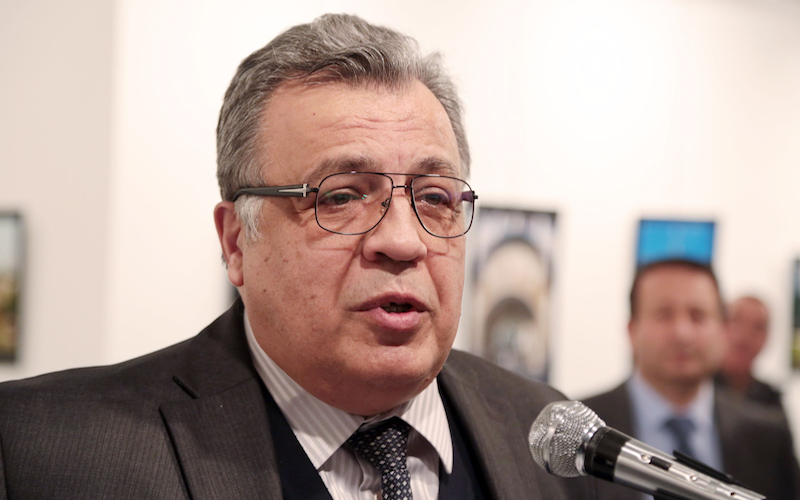
Andrei Karlov, Russia’s Ambassador to Turkey Killed
On Monday December 19, 2016, the Russian Ambassador to Turkey, Andrei Karlov, was assassinated while giving a speech at an art exhibition in Turkey’s capital, Ankara. The gunman was a 22 year old, off-duty police officer named Mevlut Mert Altintas, who disguised himself as a bodyguard wearing a suit and tie. While committing the act the assassin shouted “Don’t forget Aleppo!” Altintas was shot and killed by security forces as the ambassador was taken to the hospital, where de died.
Andrei Karlov had been Turkey’s Ambassador since July 2013. He joined the diplomatic service in 1976, served as Russia’s ambassador to Pyongyang in 2001-2006, and later worked as the chief of the foreign ministry’s consular department. Turkish President Recep Tayyip Erdogan made it clear that the “terror attacks will not harm the nation’s unity.”
After the assassination of Ambassador Karlov, Russia-Turkey relations will only grow as both countries are committed to investigate the situation in greater depth and continue to fight Islamist terrorism in Syria.
Last year, after the Turkish attack on a Russian F-17 jet in Syria, Russian-Turkish ties hit a low point, however, recently after Turkey’s apology relations have improved. President Putin called the assassination a “crime that has been committed is undoubtedly a provocation aimed at derailing the ties between Russia and Turkey, as well as the peace process in Syria.”
The shooting took place about 24 hours before the foreign ministers of Iran, Russia, and Turkey were to meet together in Moscow for a press conference about ongoing efforts in Syria, especially in Aleppo.
At the press conference, Turkish Foreign Minister Mevlut Cavusoglu said that “Turkey and Russia will work together to find out who was behind this “heinous terror attack.” The killing also poses a signal for Prime Minister Erdogan to rethink his foreign policy in Syria. Karlov has been involved in the latest ceasefire talks and evacuation plans between the rebel forces and the Assad regime in Aleppo, but despite the attack, the meetings in Moscow progressed toward more cooperation between Russia and Turkey.
The assassination of a diplomatic figure in Turkey’s capital is seen as a provocation from both sides. In their first statements, President Putin and President Erdogan realized that this assassination targeted the recently improved relations between Turkey and Russia. If that is true, this attack may bring Russia and Turkey closer together in the long run.
The assassination has gained much world attention. The United Nations called the attack “an act of terrorism.” The U.S. State Department also condemned the assassination of Andrei Karlov in a press statement stating that, “The United States condemns the assassination today in Ankara of Russian Ambassador Andrei Karlov. Our thoughts and prayers are with his loved ones, the Russian people, and with the other victims who were injured in this shooting.”
Now that the news of the killing has gone viral, the West and the international community need to wake up and face reality. The reality we are facing in the global community is that all countries face a common enemy, and that enemy is Islamist terrorism.
The assassination of Ambassador Karlov proves that we need to increase global security to prevent this from happening again in the future. The attack also shows how Russia and Turkey could potentially work together to combat terrorism that has affected both nations.

